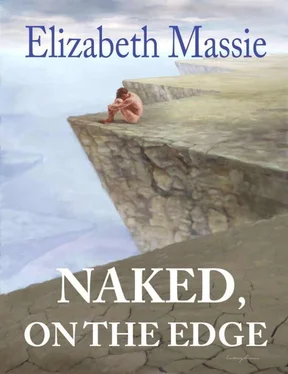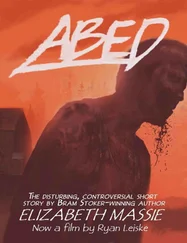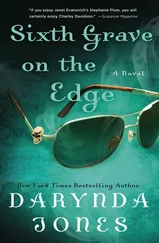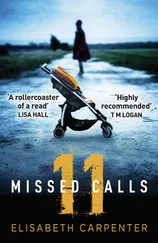Elliott wiped his eyes and tried to sit up. “Was not.”
“Was too. You getting so goddamned fat you snoring like an old man. I wish to hell you was back at school where you belong.”
Elliott blinked and rubbed his eyes.
“You can do jumping jacks, boy? Get up and show me a jumping jack.”
“I’m tired.”
“You’s always tired. I work two goddamned jobs and you say you’s tired. Show me a jumping jack!”
Elliott stood up and looked at his father. The man was short and dark and thin. His eyes were angry, dull chips in his skull. He worked at the cigarette factory in the day and the Exxon station at night. Elliott remembered his father saying once that he wished Mom would go ahead and die.
It would be easier on us both, he had said.
Elliott had cried at that, and crapped his pants, and his father had never said anything like that again.
“Do it,” said his father.
Elliott jumped up and down three times, slapping his hands together over his head as he did. When he stopped, his heart was hammering, and his breath was glass in his throat.
“I’m sick,” he sputtered.
“Hell you are.”
“I’m sick!” Elliott ran to his bedroom and cried and wet the bed. He didn’t change the sheets until the next morning.
Elliott got the mail from the mailbox. He stood on the stoop and sifted through the stack. There wasn’t much today, just a folded Little Caesar’s Pizza advertisement and a bill from the oil company. He looked through the untrimmed hedge bordering his yard at the Campbell’s trailer. He wondered how beat up the Campbell children were when they finally got taken away.
He went in and ate some Frosted Flakes from the box.
He then fixed a bowl of red and green colored special edition Cap’n Crunch left over from Christmas, stirred up some instant milk to wet it, and took it to his mother. She was awake, and clawing at the arm of her wheelchair.
Elliott put the cereal on the nightstand. “Where you going, Mom?”
“Got a cramp, got to get up and get it out.”
“Want help?”
“Course I do. I can’t do without you.”
Elliott watched for a moment. In his mind he saw his mother falling onto her face and breaking her nose. He saw the blood bleeding down into the cracks of the old linoleum where her food scraps and her cats’ pee and her own existence seemed to be drawn.
“I know,” he said. He helped his mother into the chair. “I got you breakfast.”
“Mixed it up with that shitty milk I bet.”
Elliott watched as his mother struck a match on the side of the wheelchair and touched it to the tip of the cigarette in her mouth. “Well, yeah.”
“I don’t like it.”
“I’ll give it to the cats.”
Elliott’s mother grunted and drove the heels of her hands against the wheels. The chair shuttered then rumbled out of the bedroom.
Elliott followed her. She went into the living room and, after tugging weakly at the curtains until Elliott pushed them back himself, settled before the window and looked out at the yard and the cracked walkway and the untrimmed brush and the county road.
In the kitchen, Elliott picked up the phone book.
Already, Mosby’s picture was scuffed and bent. Elliott’s father had used the phone book, treating the artwork like he treated everything else around him, as something made for a purpose, a single purpose, and nothing else. Daddy’s purpose was to work and sweat and be the head of the household. Elliott’s job was to go to school like all the other boys his age, like the boys who weren’t sick and didn’t have a ruined penis and boys whose mothers weren’t dying. And Elliott’s mother’s job was to go on and die.
The grimy, strawberry-shaped clock over the stove read ten-thirty seven. Mrs. Anderson wouldn’t be there for another three and a half hours.
Elliott went into his bedroom and sat on his cot. He pulled the paper bag out from under his pillow and looked at it. Even with the dull pencil lines, the horses were good. He was a good artist.
“Mom, you think I draw good?”
From the living room, “Huh?”
“You think I draw good?”
“Whatever.”
Elliott put the horses back. He walked through the living room into the kitchen, where, through the open door, he looked at the bony back of his mother’s neck as she looked out the window.
He turned on the stove. He filled a pan with water and set it down to boil. He wondered how bad scald burns would look. He wondered how they would feel. He felt around in the junk drawer and took out the little knife he’d used to sharpen his pencil. He wondered how hard someone would have to push if neck skin were to part?
He went out to the living room and stood beside his mother. From outside, he could hear one of the cats picking on the door.
“Cat wants in,” said his mother.
Elliott opened the door. The cat trotted in. Cats, Elliott thought, were like his father. Cats believed people had a single purpose—to serve them. Elliott shut the door and the cat ran into the kitchen in search of food.
Elliott said, “You want me to turn on the T.V.?”
“My head hurts too much. You gonna give me a massage on my head, Ellie?”
Ellie rubbed her head with one hand. In his other, he held the little knife.
He stopped then, because he could hear the water boiling in the kitchen. He left his mother and went to the stove.
Before lifting the pan, he went to the window, unlocked it, and pushed it open an inch. May air bled into the stuffy room. The crusty orange curtains trembled as if afraid of the breeze.
Elliott looked over at the Campbell’s yard. He thought about their children, taken away.
He turned Mosby’s wrinkled painting upside down.
The knife was put back into the drawer for next time, if the water wasn’t enough.
Then, sucking air through his clamped teeth, he poured the boiling water over his forearms and hands. The skin erupted, bright and red. Angry, insulted blisters rose.
He caught his breath.
“Goin’ back to bed, honey,” said his mother. She rolled away from the living room window and out of sight.
He caught his breath. Pale cat hairs, floating in the kitchen, landed on the burns and beneath the pain he almost felt a tickle.
He dropped to the kitchen chair and lost his breath; he thought of horses running running running on sand toward the beach. He caught his breath again.
Elliott faced the living room and the front door and he waited for his smiling teacher with the white, billowing sailboat coat.
Then Pilate went out to the people and saith unto them, Behold, I have found no fault with this man. The chief priests and officers cried out, Crucify him!
Pilate held forth his hand towards Jesus, who bore a crown of thorns and purple robe, and saith, I may release to thee a man on this day of feasting. Whom will ye that I release, the man Barabbas or this man Jesus?
And the crowd cried, Give us Barabbas! Jesus must die!
When Pilate saw that he could prevail nothing to save the man Jesus and that Jesus was indeed to die to please the crowd, he offered the execution of noble captives, to have the man’s wrists slashed with sword and thus causing him to bleed quickly unto death. But from the crowd called up the man Andrew, son of Phinneas the shepherd, who said, Jesus must suffer for his words! Do not give him the gentle death! Crucify Him! The crowd joined in the mocking call, He must suffer for his words!
Then Pilate went from the crowd and washed his hands, and turned Jesus to the officers and soldiers, who gave unto Him a cross and bearing such went all unto the place of the skull which is called Golgotha.
There they crucified Him, and two others on either side with Jesus in the midst.
Читать дальше












